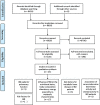Body Mass Index Is Associated with Inflammatory Bowel Disease: A Systematic Review and Meta-Analysis
- PMID: 26658675
- PMCID: PMC4684381
- DOI: 10.1371/journal.pone.0144872
Body Mass Index Is Associated with Inflammatory Bowel Disease: A Systematic Review and Meta-Analysis
Abstract
Background: Prior work suggested that patients with inflammatory bowel diseases (IBD) have lower body mass index (BMI) than controls and patients with lower BMI have more serious complications.
Goal: The study was aimed to find relationship between BMI in patients with and without IBD, investigate effects of medicine therapy and disease stages on patients' BMI.
Methods: Potentially eligible studies were identified through searching PubMed, Cochrane and Embase databases. Outcome measurements of mean BMI and the number of patients from each study were pooled by a random-effect model. Publication bias test, sensitivity analysis and subgroup analysis were conducted.
Results: A total of 24 studies containing 1442 patients and 2059 controls were included. Main results were as follows: (1) BMI in Crohn's disease (CD) patients was lower than that in health controls (-1.88, 95% CI -2.77 to -1.00, P< 0.001); (2) Medical therapy significantly improved BMI of CD patients (with therapy: -1.58, -3.33 to 0.16; without: -2.09, 95% CI -3.21 to -0.98) while on the contrary not significantly improving BMI of UC patients (with therapy: -0.24, 95% CI -3.68 to 3.20; without: -1.34, 95% CI -2.87 to 0.20, P = 0.57); (3) Both CD and UC patients in active phase showed significantly greater BMI difference compared with controls than those in remission (CD patients: remission: -2.25, 95% CI -3.38 to -1.11; active phase: -4.25, 95% CI -5.58 to -2.92, P = 0.03; UC patients: remission: 0.4, 95% CI -2.05 to 2.84; active phase: -5.38, -6.78 to -3.97, P = 0.001).
Conclusions: BMI is lower in CD patients; medical therapy couldn't improve BMI of IBD patients; the state of disease affects BMI of CD patients and UC patients.
Conflict of interest statement
Figures








Similar articles
-
Vitamin D for the treatment of inflammatory bowel disease.Cochrane Database Syst Rev. 2023 Oct 2;10(10):CD011806. doi: 10.1002/14651858.CD011806.pub2. Cochrane Database Syst Rev. 2023. PMID: 37781953 Free PMC article.
-
Placebo response and remission rates in randomised trials of induction and maintenance therapy for ulcerative colitis.Cochrane Database Syst Rev. 2017 Sep 8;9(9):CD011572. doi: 10.1002/14651858.CD011572.pub2. Cochrane Database Syst Rev. 2017. PMID: 28886205 Free PMC article.
-
Aminosalicylates for induction of remission or response in Crohn's disease.Cochrane Database Syst Rev. 2016 Jul 3;7(7):CD008870. doi: 10.1002/14651858.CD008870.pub2. Cochrane Database Syst Rev. 2016. PMID: 27372735 Free PMC article.
-
Stem cell transplantation for induction of remission in medically refractory Crohn's disease.Cochrane Database Syst Rev. 2022 May 13;5(5):CD013070. doi: 10.1002/14651858.CD013070.pub2. Cochrane Database Syst Rev. 2022. PMID: 35556242 Free PMC article.
-
Withdrawal of immunosuppressant or biologic therapy for patients with quiescent Crohn's disease.Cochrane Database Syst Rev. 2018 May 12;5(5):CD012540. doi: 10.1002/14651858.CD012540.pub2. Cochrane Database Syst Rev. 2018. PMID: 29756637 Free PMC article.
Cited by
-
Integrating the serum proteomic and fecal metaproteomic to analyze the impacts of overweight/obesity on IBD: a pilot investigation.Clin Proteomics. 2023 Feb 9;20(1):6. doi: 10.1186/s12014-023-09396-y. Clin Proteomics. 2023. PMID: 36759757 Free PMC article.
-
Long-term Risk of Herpes Zoster Infection in Patients With Ulcerative Colitis Receiving Tofacitinib.Inflamm Bowel Dis. 2023 Jan 5;29(1):85-96. doi: 10.1093/ibd/izac063. Inflamm Bowel Dis. 2023. PMID: 35648151 Free PMC article. Clinical Trial.
-
Quality of Life in Inflammatory Bowel Diseases (IBDs) Patients after Surgery.Rev Recent Clin Trials. 2022;17(4):227-239. doi: 10.2174/1574887117666220811143426. Rev Recent Clin Trials. 2022. PMID: 35959618 Review.
-
Protective Effects of High-Fat Diet against Murine Colitis in Association with Leptin Signaling and Gut Microbiome.Life (Basel). 2022 Jun 28;12(7):972. doi: 10.3390/life12070972. Life (Basel). 2022. PMID: 35888062 Free PMC article.
-
Phytotherapies in inflammatory bowel disease.J Res Med Sci. 2019 May 22;24:42. doi: 10.4103/jrms.JRMS_590_17. eCollection 2019. J Res Med Sci. 2019. PMID: 31160909 Free PMC article. Review.
References
-
- Podolsky DK. Inflammatory bowel disease. The New England journal of medicine. 2002;347:417–429 - PubMed
-
- Chen Y, Liu L, Wang X, Wang J, Yan Z, Cheng J, et al. Body mass index and risk of gastric cancer: a meta-analysis of a population with more than ten million from 24 prospective studies. Cancer epidemiology, biomarkers & prevention: a publication of the American Association for Cancer Research, cosponsored by the American Society of Preventive Oncology. 2013;22(8):1395–408. - PubMed
Publication types
MeSH terms
Substances
LinkOut - more resources
Full Text Sources
Other Literature Sources
Medical

